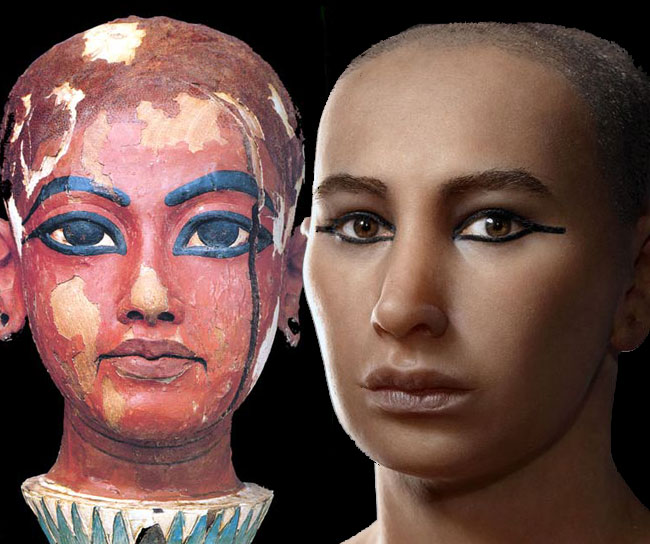King Tut Related to Half of European Men? Maybe Not

A personal genomics company in Switzerland says they've reconstructed a DNA profile of King Tutankhamen by watching the Discovery Channel, claiming the results suggest more than half of Western European men are related to the boy king. But researchers who worked to decode Tut's genome in the first place say the claim is "unscientific."
Swiss genomics company iGENEA has launched a Tutankhamen DNA project based on what they say are genetic markers that appeared on a computer screen during a Discovery Channel special on the famous pharaoh's genetic lineage.
"Maybe they didn't know what they showed, but we got 16 markers from the Y chromosome from these pharaohs," Roman Scholz, the managing director of iGENEA, told LiveScience.
If the claims were true, it would put King Tut in a genetic profile group shared by more than half of Western European men. That would make those men relatives — albeit distant ones — of the pharaoh.
But Carsten Pusch, a geneticist at Germany's University of Tubingen who was part of the team that unraveled Tut's DNA from samples taken from his mummy and mummies of his family members, said that iGENEA's claims are "simply impossible." Pusch and his colleagues published part of their results, though not the Y-chromosome DNA, in the Journal of the American Medical Association (JAMA) in 2010. The Y chromosome is the sex chromosome found only in males, and looking at the genes in this chromosome would show Tut's male lineage.
Pusch's team used snippets of Y-chromosome DNA to link Tut to his closest relatives, identifying his mom and dad. But they didn't publish the full genetic data that would allow genomics companies like iGENEA to link modern people to the Tutankhamen lineage. According to Scholz, that crucial data is what appeared on the Discovery Channel.
"Dr. Albert Zink from the EURAC [European Academy of Bolzano, an independent research center] in Bolzano and co-author of the 2010 JAMA publication screened the footage and confirmed that the company acts very unscientific," Pusch wrote in an email to LiveScience. "The Swiss company did not try to get into contact with us prior to launching their new Internet page."
Get the world’s most fascinating discoveries delivered straight to your inbox.
The alleged Discovery Channel markers put Tut in a genetic profile group, or haplogroup, that also includes more than half of the men in Western Europe. Scholz said the company is now searching for the closest living relatives of Tutankhamen, men who share all 16 genetic markers on the pharaoh's supposed Y chromosome. Exact matches get a refund for their $179 to $399 test and will also get free additional DNA analysis.
The haplogroup R1b1a2, which iGENEA claims includes King Tut, arose 9,500 years ago in the Black Sea region. How Tut's ancestors would have gotten from that region to Egypt is unknown, but Scholz said iGENEA hopes to learn more by collecting more close and exact matches from modern people of Western European descent.
"The better the match, the more recent the common ancestor," Scholz said.
But people hoping to prove that they've got an ancestor in common with the notoriously sickly boy king should take iGENEA's claims with a grain of salt, Pusch said: "It appears that they try to better sell their DNA testing kit by using the media attention connected to King Tut."
You can follow LiveScience senior writer Stephanie Pappas on Twitter @sipappas. Follow LiveScience for the latest in science news and discoveries on Twitter @livescience and on Facebook.

Stephanie Pappas is a contributing writer for Live Science, covering topics ranging from geoscience to archaeology to the human brain and behavior. She was previously a senior writer for Live Science but is now a freelancer based in Denver, Colorado, and regularly contributes to Scientific American and The Monitor, the monthly magazine of the American Psychological Association. Stephanie received a bachelor's degree in psychology from the University of South Carolina and a graduate certificate in science communication from the University of California, Santa Cruz.
 Live Science Plus
Live Science Plus





